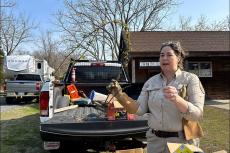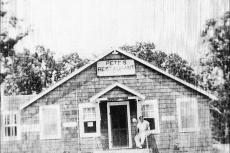The Sagaponack Village Board jettisoned a proposed amendment to its composting laws at a public hearing on Oct. 16 after input from the Long Island Farm Bureau, the Cornell Cooperative Extension, and local farmers.
“Only compost, mulch, or other organic biomass crops, as defined in Section 301 of the New York Agriculture and Markets Law, grown or produced on the property is permitted to be composted,” the proposed amendment read. “No tree debris or yard trimmings . . . may be composted on any property within the Village of Sagaponack, unless such debris and trimmings are grown or produced on the same property.”
The intent of the amendment was to prevent leaves, brush and such from being “trucked in” from elsewhere, which, said Mayor Bill Tillotson, has become increasingly common in neighboring hamlets.
“Is bringing in brush and stuff essential to farm operations?” the mayor argued at the start of the meeting. “It hasn’t been for 300 years.”
Rob Carpenter, administrative director of the Long Island Farm Bureau, asked that the board table the amendment and make another that would be acceptable to local farmers. He raised several issues with the current proposal.
First, he said, it does not adequately account for the science of composting, which is identified by the Climate Leadership and Community Preservation Act as a “carbon sink” that benefits soil health. Next, composting boosts nitrogen, which saves farmers money as they don’t have to buy supplemental nitrogen for their fields.
“Let’s not forget that Southampton Town, the County of Suffolk, the Village of Sagaponack have worked tirelessly over the years in preserving farmland, and they did this for a reason — because they recognized the benefits of our farms to our communities,” said Mr. Carpenter. “It’s up to us, now that a majority of the farmland is preserved, to now foster our farmers and allow them to be able to utilize the land in the way that it was intended to be used in agricultural production.”
The mayor commented that a main reason the board had proposed the amendment was to help with farmland preservation. The village, he said, relies to a large extent on private donorsto help fund its preservation efforts, and if “a major composting operation, with trucks and outside materials,” is happening at a nearby farm, then “no one s going to donate money” to preserve the farmland.
“That’s what this public hearing is about — to find some way that the remaining land out there that needs to get preserved, gets preserved,” he said.
When the board asked for input from local farmers. Marilee Foster was among those who spoke up. “As farmers, what we don’t need is more limitations,” she said. “All those agencies that Rob Carpenter mentioned — I’m on a first-name basis with somebody from all those departments — that’s crazy.Ilove them all, but all of them take up time and paperwork just so I can plant a few acres of vegetables. That seems really over the top. So, I get afraid when I see the village lining up to be one of those paperwork agencies.”
Lee Foster, Marilee’s mother, noting that their family has “strong and enduring ties to farmland,” agreed, describing the proposed amendment as “a restriction that has been formulated by an attorney without input from those whom it would affect.” “Farmerslive to protect their land “like progeny,” she argued, but the amendment “does nothing to protect farmland.”
Emily Lindback, an agricultural stewardship specialist at the Cornell Cooperative Extension, walked through the scientific side of composting, arguing that the process acts as a natural fertilizer and helps with organic farming.
“If any of this is a hindrance to the farmers here in Sagaponack, then we shouldn’t considerit,” said Trustee David McMillan during a discussion among board members. Mayor Tillotson similarly described himself as “pro-farm.”
The board had originally intended to review the public comments and then hold another meeting for further input, asthe farmers and advocates had requested.In the end, however, members decided to hold a vote on the spot, and unanimously struck down the proposed law.



